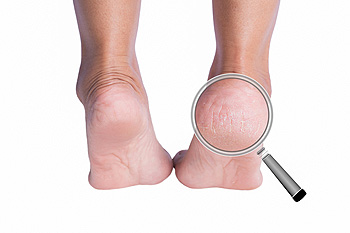
Cracked heels, a common foot woe, often disrupts the smoothness of our soles and serves as a visual cue of underlying issues. Dry, flaky skin on the heels is typically the first sign, progressing into painful fissures if left unaddressed. The causes of cracked heels are multifaceted, encompassing factors such as prolonged standing, obesity, and wearing poorly fitted shoes that contribute to increased pressure on the feet. Dry and harsh weather conditions strip the skin of its natural moisture, exacerbating the problem. Lack of proper foot care, inadequate hydration, and certain medical conditions, like diabetes or thyroid disorders, can also play a role. Additionally, an insufficient intake of vitamins and minerals, particularly zinc and omega-3 fatty acids, may contribute to compromised skin health. Understanding the root causes of cracked heels is essential for implementing effective preventive measures. If you have developed cracked heels, it is suggested that you consult a podiatrist who can determine what the cause is, offer effective treatment options, and guide you toward prevention techniques.
Cracked heels are unsightly and can cause further damage to your shoes and feet. If you have any concerns, contact one of our podiatrists from Waterbury Podiatry Consultants. Our doctors can provide the care you need to keep you pain-free and on your feet.
Cracked Heels
Cracked heels appear unappealing and can make it harder for you walk around in sandals. Aside from looking unpleasant, cracked heels can also tear stockings, socks, and wear out your shoes. There are several methods to help restore a cracked heel and prevent further damage.
How Do You Get Them?
Dry skin is the number one culprit in creating cracked heels. Many athletes, walkers, joggers, and even swimmers suffer from cracked heels. Age and skin oil production play a role to getting cracked heels as well.
Promote Healing
Over the counter medicines can help, especially for those that need instant relief or who suffer from chronic dry feet.
Wear Socks – Wearing socks with medicated creams helps lock in moisture.
Moisturizers – Applying both day and night will help alleviate dryness which causes cracking.
Pumice Stones – These exfoliate and remove dead skin, which allows for smoother moisturizer application and better absorption into the skin.
Change in Diet
Eating healthy with a well-balanced diet will give the skin a fresh and radiant look. Your body responds to the kinds of food you ingest. Omega-3 fatty acids and zinc supplements can also revitalize skin tissue.
Most importantly, seek professional help if unsure how to proceed in treating cracked heels. A podiatrist will help you with any questions or information needed.
If you have any questions, please feel free to contact our offices located in Waterbury and Southington, CT . We offer the newest diagnostic and treatment technologies for all your foot care needs.
